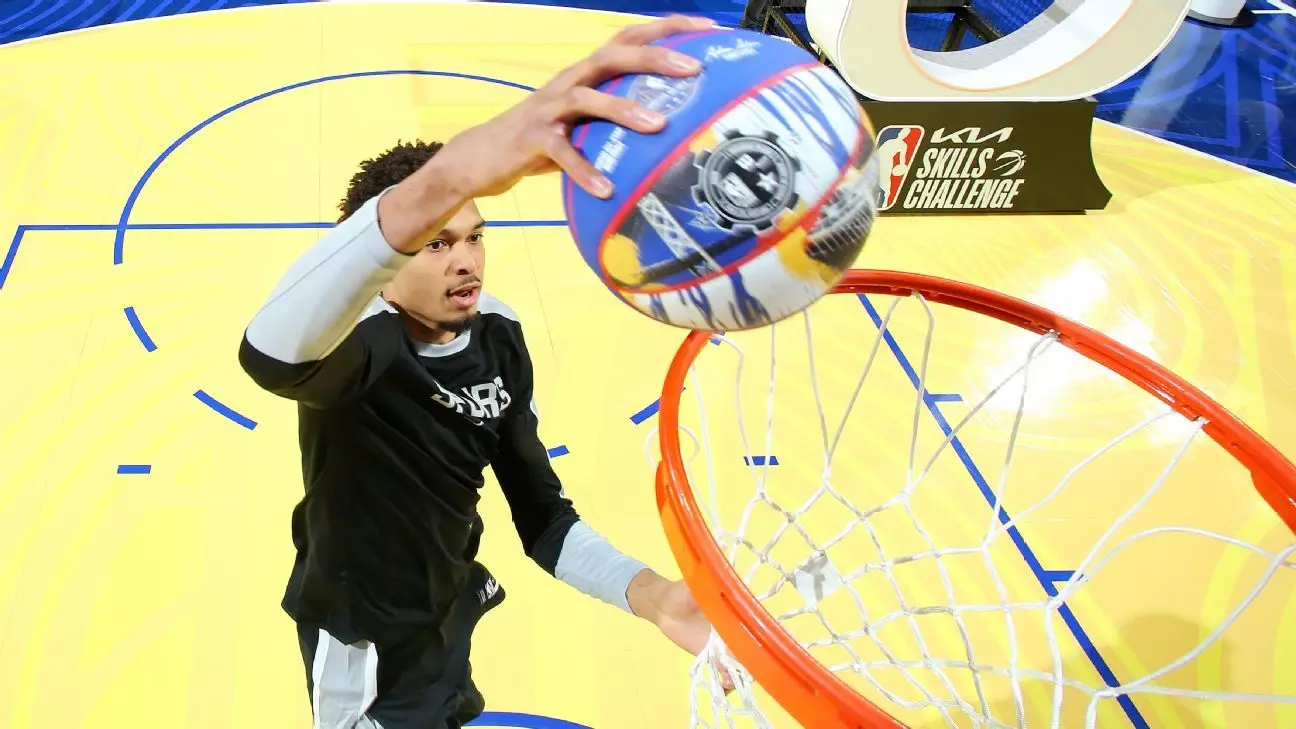The Kia Skills Challenge, a popular feature of the NBA All-Star weekend, provides a platform for players to showcase not just their scoring abilities, but their overall basketball skills. This year’s event, held in San Francisco, drew significant attention, particularly due to Team Cavs emerging victorious, but the ripple effects of a controversial disqualification echoed throughout the night. The interplay between strategy, execution, and adherence to the rules is always a delicate balance in competitive sports, and this event was no exception.
The Skills Challenge featured various teams, but none stirred more discussion than Team Spurs, comprised of Chris Paul and rookie sensation Victor Wembanyama. Their strategy hinged on a bold interpretation of the rules, where the duo focused heavily on passing rather than shooting. In a segment meant to test their shooting accuracy, Paul and Wembanyama opted to bypass traditional shot attempts, instead launching only one dunk from Wembanyama. They finished the round with an impressive time of 47.9 seconds, yet this performance was overshadowed by an immediate disqualification.
The disqualification stemmed from the duo not executing the requisite valid shot attempts as laid out in the Skills Challenge’s rules; they threw shots toward the basket but failed to connect. This choice to prioritize speed over accuracy was ultimately their undoing, illuminating how an innovative strategy can sometimes lead to unexpected consequences in regulated competitions.
The rules of the Skills Challenge are designed to ensure a fair and competitive environment, yet the ambiguity within these guidelines can often open the door to different interpretations. Wembanyama’s assertion that their approach exploited a „loophole“ raises critical questions regarding clarity in sports regulations. His approach was rooted in a genuine attempt to innovate, seeking to claim victory in a format that emphasizes efficiency and skill.
Chris Paul’s defense of their strategy, claiming that they were simply attempting to execute a winning game plan, highlights the tension between creativity and adherence to established norms. Paul’s experience, as someone who knows the importance of strategy in securing wins, brought to light the difficulties players face when attempting to innovate within strict parameters.
Communication played a pivotal role in this controversy. Draymond Green, a member of the rival Team Warriors, noted Wembanyama’s efforts to clarify the legality of their non-shooting approach by consulting multiple league officials. This commitment to understanding the competitive landscape reflects the broader theme of communication in sports; being informed can make a significant difference between winning and losing.
However, the outcome also raises concerns about whether Wembanyama asked the right individuals for guidance. The complexities inherent in competitive rules can often lead to misunderstandings, particularly for new players adapting to the NBA’s expectations. In this case, an abundance of inquiries led to a misaligned strategy that was ultimately penalized.
As the dust settles on the Skills Challenge, several lessons emerge from the unfolding drama. First, while creativity is essential in sports, it must be balanced with a keen understanding of the rules and their interpretations. Second, communication stands as a vital pillar in any competition; clear interactions can safeguard against missteps that might tarnish an otherwise stellar performance. Finally, the debate surrounding Team Spurs‘ disqualification emphasizes the need for sports organizations to continuously review and refine their regulations to reduce ambiguity and foster fair competition.
While Team Cavs celebrated their victory, the broader conversation surrounding the Skills Challenge showcased the complexities of competitive sports. This incident serves as a reminder for players and officials alike of the fine line between innovation and adherence to rules—one that can redefine the landscape of sporting events. As attendees look forward to future Skills Challenges, one can only hope that clarity and fair play will prevail in what can often be a nuanced arena.


Napsat komentář